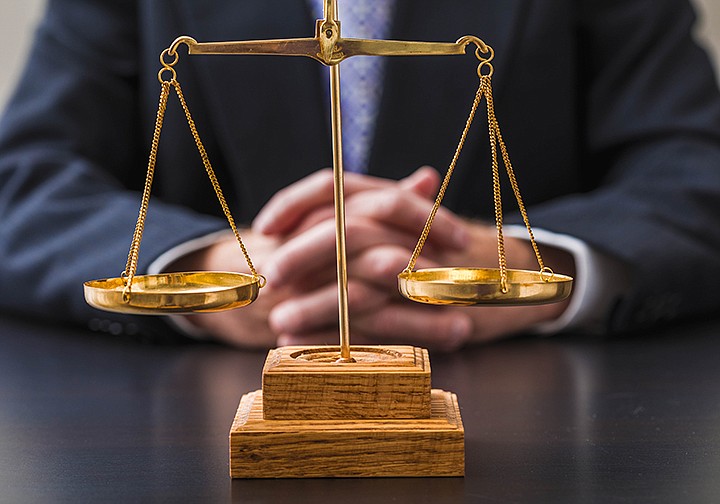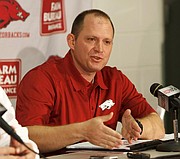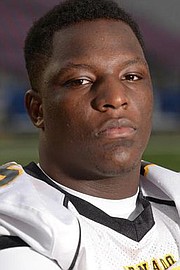TEXARKANA - Criminal defense lawyers fulfill a critical role in making certain the Constitutional rights of the accused are protected.
Without a thorough and vigorous defense, we can't be sure that a person accused of a crime is guilty beyond a reasonable doubt. If the right motions are not filed, if the right objections and arguments are not raised and if the right questions are not posed to witnesses, justice may be compromised.
If a person does not receive the defense guaranteed all accused of crimes in America, an innocent person could be convicted or a guilty person could be freed on appeal. Criminal defense lawyers not only defend their clients, they protect the rest of us by making certain that, when a person is convicted, it is because they are guilty.
When accused murderers, child molesters, drunken drivers or thieves have received a robust defense and are convicted, they are more likely to have their convictions affirmed by a higher court. Most criminal cases are resolved without a trial through plea bargains, which often result in better sentences for the offender at much lower expense for the state or government.
Texarkana has a number of highly skilled lawyers who focus their practices on criminal defense. We wondered why someone would devote their legal career to the side that most often "loses" in a criminal proceeding.
Here are what six of Texarkana's criminal defenders said about their work.
Jeff Harrelson
During his more than 23 years in the practice of law, Harrelson has represented first-time offenders accused of misdemeanors and fought for the rights of those accused of capital murder, child exploitation or armed robbery. His clients range from the ordinary man making a one-time misstep to the offenders who lead us to lock our doors at night and go through our children's cell phones.
"I believe everyone deserves their day in court, and oftentimes, it's only me and maybe some family members trying to improve their situation when the power of the government is bearing down on them," Harrelson said. "I'm proud to be that person helping the least, the last and the lost."
Before and during law school, Harrelson worked at the Pulaski County, Arkansas, prosecuting attorney's office in Little Rock and clerked in the Arkansas Senate, where he developed a strong interest in the criminal justice system. Although he started out handling all types of cases, Harrelson soon started focusing his practice on criminal defense matters in Arkansas, Texas and federal courts.
"I believe in our constitutional principles of presumption of innocence and holding the government to their burden of proof beyond a reasonable doubt before we deprive accused individuals of their liberty. If I didn't, I shouldn't handle some of the more difficult or higher stakes cases that I do," Harrelson said.
"Some common misperceptions about the criminal justice system I encounter are that an arrest doesn't necessarily mean someone is guilty of what they are arrested for. The presumption of innocence is the opposite of 'where there's smoke, there's fire.' Also, a bail bond is merely to ensure a person's appearance in court it's not a punishment."
Harrelson said there is more to a case than often meets the eye.
"Until a person sitting in judgment knows all the relevant facts, (guilt or innocence) is not always an easy determination. As humans, it's easy to make a judgment after reading a headline or news account of an alleged crime. There are often numerous circumstances involved that go beyond what someone can read or hear about in a couple of minutes. Most cases resolve themselves by a settlement, or a negotiated plea, but when the parties can't reach a settlement, a trial is necessary," Harrelson said. "I've tried over 75 cases to a jury where a settlement as to either guilt or punishment can't be reached."
Harrelson operates a private practice and is often appointed to represent defendants by judges in state and federal courts.
Jason Mitchell
Mitchell is the managing public defender for the Eighth Judicial District South serving Miller and Lafayette counties in Arkansas. The bulk of defedants charged in those counties are represented by his office.
"I enjoy being the underdog and enjoy the role of helping those who society has largely abandoned," Mitchell said. "Being poor should not exclude someone from having a professional and skilled legal defense when they are accused of a crime."
Mitchell pointed out that public defenders are often challenged to do more with less.
"The attorneys who work in the public defender's office are dedicated, highly skilled attorneys. Throughout the State, we are overloaded with cases and underfunded. We are not doing this job to get rich, but we want to help those who need help," Mitchell said. "Our offices are funded at a fraction of what the prosecuting attorney's offices are. Here in Miller and Lafayette counties, we have two full-time attorneys and three part-time attorneys versus a prosecutor's office that has six full-time attorneys and one part-time attorney."
A guilty plea can be a fresh start or a second chance.
"I love working with the drug court program and seeing the positive impact it has on peoples' lives. Generally, when I see a client, they are in jail and at the lowest point in their life. Every time someone graduates from drug court, I have seen firsthand the work they put in and the change in their lives over the course of the program," Mitchell said.
"It is very gratifying and good for the soul. Many times, the same thing happens when following a juvenile into productive, eager young men and women who once just needed a helping hand. It makes it all worthwhile."
Rick Shumaker
Shumaker is the chief public defender for Bowie County and has worked for the office since its creation. He began practicing law in 1982.
"Criminal law is interesting as the cases are always different and distinct. No two cases are generally the same," Shumaker said.
Shumaker said a challenge for defense lawyers is getting jurors to understand the burden of proof, which must be overcome to find someone guilty of a crime.
"Reasonable doubt is not about whether or not the jurors and/or the public feel the person committed the crime. 'May have done it, probably did it, could have done it,' are not the standard to find someone guilty. The question becomes whether there is a reasonable doubt as to the person's guilt of the offense. If there is such a doubt, they are required by law to acquit the person accused."
Shumaker said his work is not about the character of the accused but the integrity of the system.
"I get asked a lot of times how I can represent 'these' people. I think our Constitution and our system of justice is the best system around. Every person is presumed innocent unless the government can prove guilt beyond a reasonable doubt.
"I don't care how guilty an individual may be, they still have the right to a fair and impartial trial. If the government cannot prove their guilt in a fair and impartial trial, then the person must be set free. I realize a lot of citizens do not agree with this position, but they need to think about if they or a family member are accused of a crime."
Shumaker said technology is no substitute for the courts.
"With all the social media in today's society, I think that in most instances you are 'guilty until you prove yourself innocent.' I read a lot of the comments on social media when someone is simply arrested and accused of a crime and the 'Court of Public Opinion' immediately assumes they are guilty," Shumaker said.
"I think our society has lost sight of the concept of presumption of innocence and proving guilt beyond a reasonable doubt. An old saying that I still live by today is, 'I would rather 100 guilty men go free than to see one innocent man go the penitentiary.'"
Seeing the positive side of a guilty plea is what Shumaker finds most rewarding.
"We have a lot of addiction in our society that is behind most of our crimes. I work with the Drug Courts of Bowie County, and they focus on recovery from addictions. And it is a pleasure to see someone at their lowest point go through Drug Court and recovery and come out a productive member of society."
Sylvia Delgado
Delgado, an assistant public defender for Bowie County, didn't set out with a career in criminal defense in mind but has come to love the work. A loved one's illness brought her to the area she now serves.
"I always worked as a government attorney. I worked for the Department of Aging and Disability Services, for the State Bar's Chief Disciplinary Counsel, for the Department of Insurance and Texas Workforce Commission. This job is my first time defending; I always worked the other side of the courtroom," Delgado said.
"Now that I do defense, I love it and would have a hard time not doing it. I feel my work, especially my best work, is essential to the justice system. The indigent clients I serve appreciate my honest, straightforward style. I tell them, 'I'm not going to lie or tell you something I don't know. Here's how I see your case. ' Almost uniformly, they appreciate my help."
Delgado said there are common misunderstandings about the criminal justice process.
"Primarily, people often believe a plea of 'not guilty' means we are saying the crime didn't happen. In reality, it's usually a place holder unless and until we can find an acceptable resolution to the case. We will be appearing many times before resolving the matter and I would be a terrible felony defense lawyer if I pled my clients guilty at their first appearance," Delgado said. "I have to devote some time to discuss the case with the client, with witnesses and with the DA if that might help. Eventually, we will enter a plea agreement or go to trial."
Delgado said the accused themselves are often confused.
"The prosecutor makes offers, we do not. We convey those offers and may get the client a better offer or try to prove them not guilty. We do not write the offers," Delgado said. "Judges do not, and should not, involve themselves in the plea bargain process. Only if we go to trial do the underlying facts of the case come out in court."
Delgado said rules of ethics for her profession are important, guiding principles.
"If I don't know how to provide the best possible representation, I am required to seek the assistance of a more knowledgeable lawyer. I cannot ethically provide marginal representation or do anything less than my best work, in every case, for every client," Delgado said.
While likely the most stressful part of the job, Delgado finds trials most rewarding.
"Even when we don't 'win,' my clients are happy that I fought for them. I have received many notes, hugs, smiles and words of gratitude that mean a lot to me. It is never about winning, it's about serving our clients and letting them feel they've been heard," Delgado said. "When I do that, I sleep well at night and work with a smile on my face."
Jason Horton
Horton did not begin his legal career with a criminal defense specialty in mind.
"After I spent five years at a civil law firm, Jeff Harrelson brought me on to help with his criminal caseload. During my first few months with Jeff, I remember a time when we had four cases set for trial on Judge Jim Hudson's trial docket. Jeff was used to that. I was not. When I asked how we were supposed to be ready for four separate trials at the same time, Judge Hudson responded, 'Welcome to criminal law.' I jumped in with both feet and never looked back," Horton said.
Horton said good lawyers make the system work.
"Do innocent people get charged with crimes? Absolutely. However, in my experience, that number is relatively low. It all depends on the folks who are doing the prosecuting. I have had the benefit of working with some incredible DA's offices and United States Attorney's offices who think big picture and don't get lost in the weeds," Horton said.
"I have also worked with some prosecuting attorneys who take a 'win at all cost' approach. Our criminal justice system is only as strong as the players involved. I have seen the system work, and I have seen the system fail."
Helping people through the system is Horton's priority.
"I do everything I can within the confines of the law to preserve the integrity of our justice system. For many of my clients, their run-in with the criminal justice system is an isolated event. It happened once and it won't happen again. We take pride in providing encouragement during those very difficult times. In the process, we do everything possible to make sure our clients' rights are protected.
"If a trial is necessary, we do our best to leave no stone unturned so the jury can make an informed decision," Horton said. "Helping people reach a fair and just resolution in a case (is what I find most rewarding). This can take weeks, months or even years. The end result can range from a full dismissal to a lengthy prison sentence. But the point is to make sure people are treated with dignity and fairly under the law."
John Pickett
Pickett has practiced civil and criminal law for more than three decades and is board certified in criminal law.
"I am here to serve people who are in trouble, who are in need of help, because their life and liberty are in jeopardy. I am here to protect their constitutional rights and to prepare and present their defense to the accusations made against them," Pickett said.
"For most people, it is overwhelming when the government arrests, indicts and prosecutes them or their family or friends. When a person is in that overwhelming situation, they need to know there is an advocate for them and that they are not alone as they endure this troubling time."
Pickett said criminal defense work is "intensely stressful because people's lives and liberties are at stake."
"Most people never imagine, much less expect, that they would ever be accused of a crime. Until you have that life experience, it can be difficult to understand and appreciate the need of an accused to have his or her constitutional rights - such as being presumed innocent or requiring the government to prove the guilt of the accused beyond a reasonable doubt - protected and be given a fair and impartial opportunity to defend themselves against the accusations. It is absolutely necessary that an accused person have a competent and capable criminal defense attorney to serve them in this regard," Pickett said.
Pickett said that with the pressure of his job comes great fulfillment and reward.
"One of my favorite quotes of an old lawyer that I heard during his closing argument was, 'Punishment, not tempered with mercy, is vengeance and vengeance is for no mortal man.' I've never forgotten that quote all these years. It is at the very heart of what I do as a criminal defense attorney."
Pickett also mentioned famous words spoken by Theodore Roosevelt about fighting tenaciously for worthy causes even in the face of defeat.
"At the end of my career, I just want it said of me that, as a criminal defense lawyer, I was that man in the arena."







